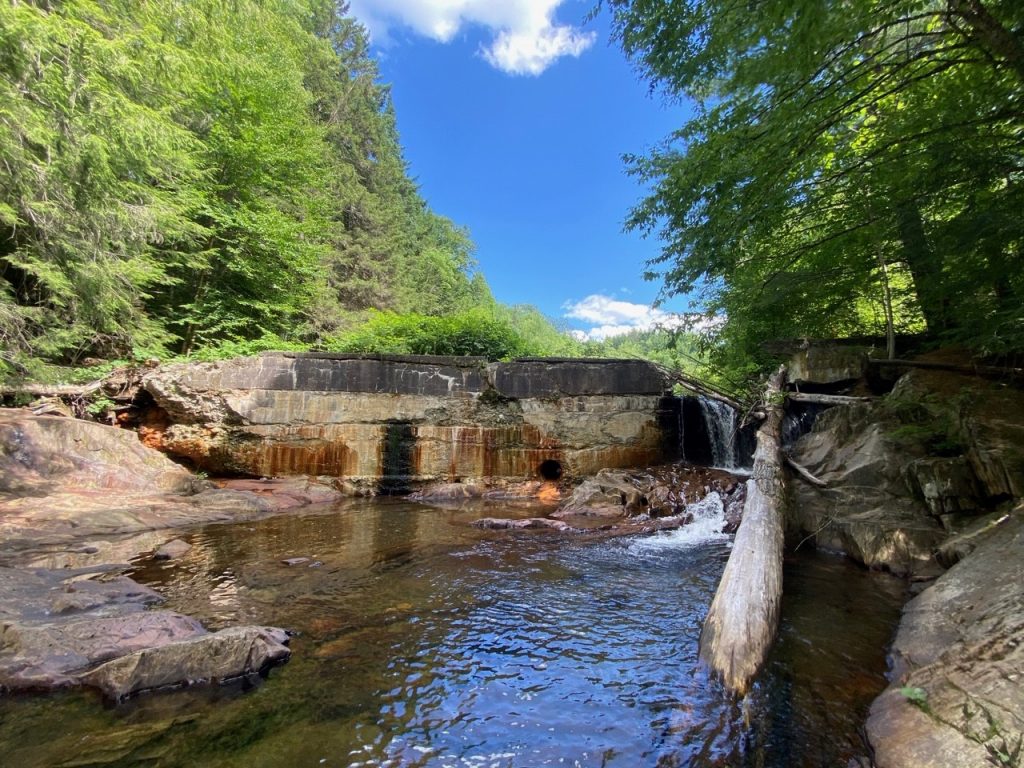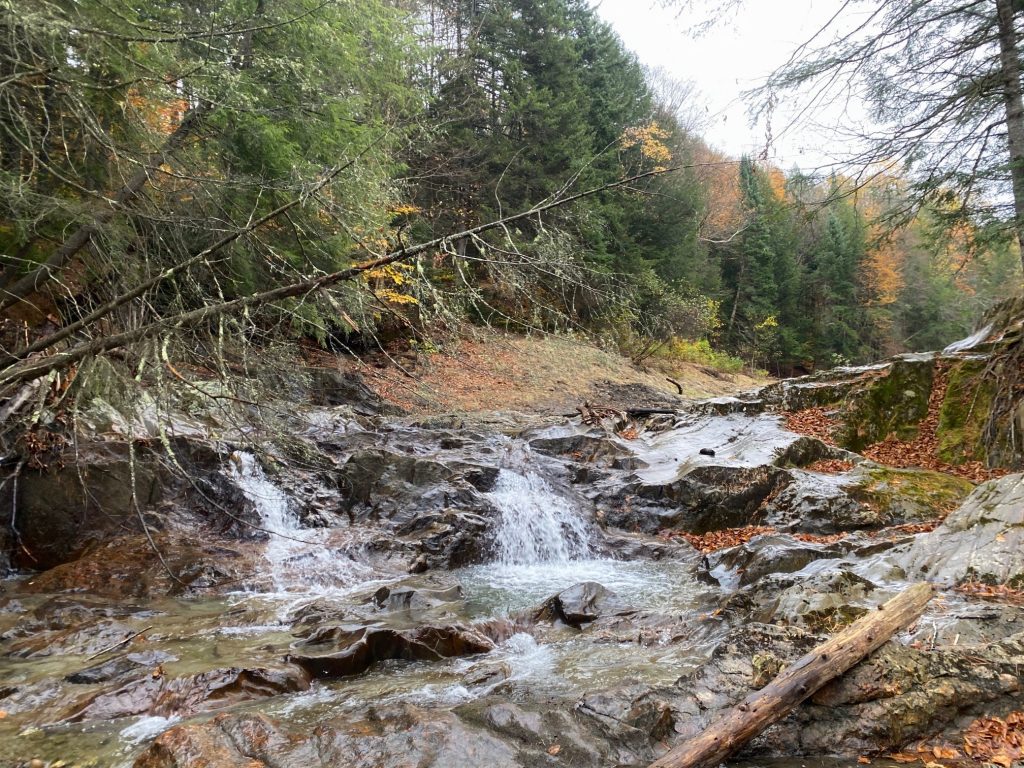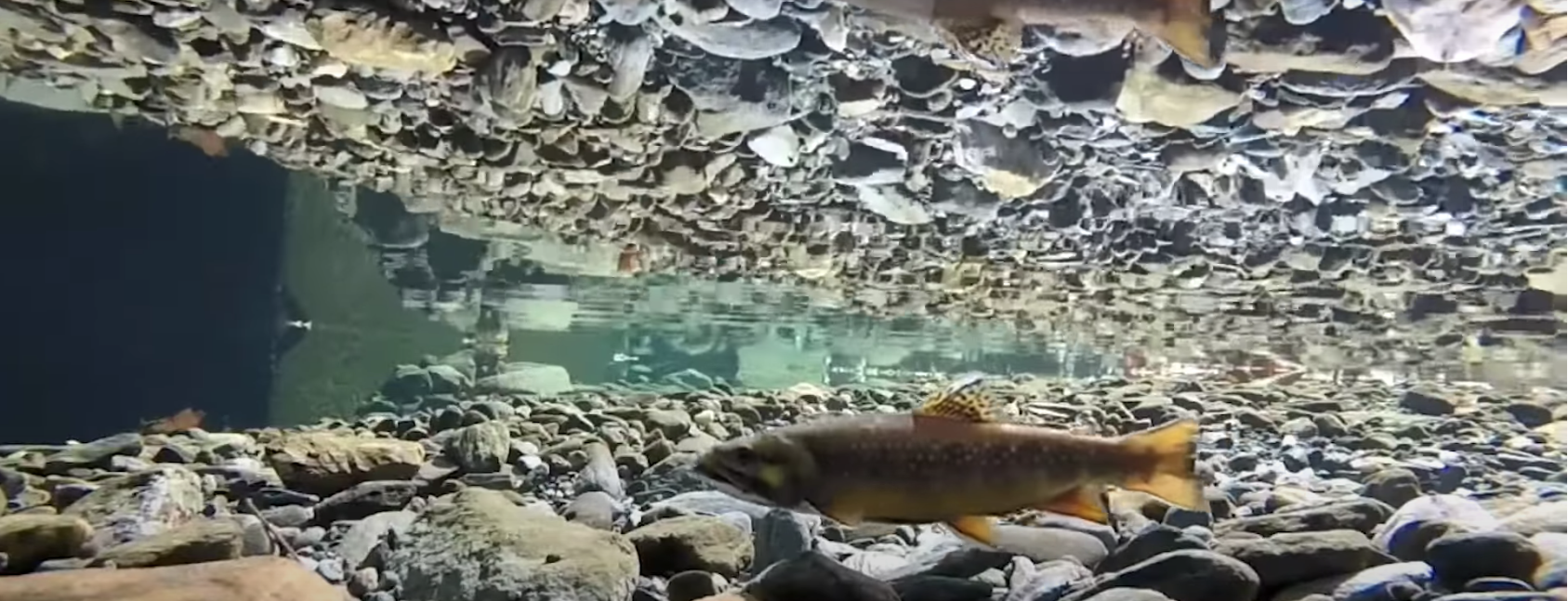Take it from Lisa Burr, owner of The Woods Lodge in Northfield. In the Bennington Banner today, Burr explains how removing a derelict dam on her property made the land safer and more beautiful, saving her business. It also restored the fish population in Bull Run Brook, so the lodge can now start attracting anglers for the first time. Find the story below.
Burr’s commentary also appeared in VTDigger, the Brattleboro Reformer, and the Times-Argus/Rutland Herald.

Before 
After
When my husband and I bought The Woods Lodge in 2004, located in Northfield along a tributary of the Winooski River called Bull Run Brook, the interior of the main lodge was largely in disrepair, but there wasn’t much reason to fix it up, because most of our visitors were there to enjoy the outdoors while staying in our cottages and bunkhouses. Groups like families and friends celebrating reunions and children’s day camps used our trails, treehouse, labyrinth path, swimming pool and recreation fields located by the brook. There was lots to do outdoors, and our guests loved it.
Suddenly, by the force of nature, everything changed for our family-run business. In May of 2011, lightning hit our wellhead and we spent the summer restoring electricity to our lodge. Just as we were getting back on our feet from that disaster, Tropical Storm Irene destroyed that beloved outdoor area adjacent to Bull Run and wreaked havoc on our property.
We shut down operations for the entirety of the following year, and part of the next, to make repairs. We bought a tractor to help restore the land to its original condition (thinking the flood was, as most did, a once-in-100-years event). Friends, and neighbors we didn’t even know, as well as cadets from nearby Norwich University came to our aid to clear away the mud and muck that had flooded into our commercial-sized swimming pool.
But our efforts were no match for Mother Nature. In early July 2013, the river reclaimed—again—the entire area we’d worked so hard to restore. Bull Run hadn’t just flooded, it had re-routed itself, taking the tractor with it. (We found it upside down, bobbing up against the backside of the dam on our property).
It turns out that the force of Irene had essentially raised the level of our brook’s bed by almost three feet, and the river had carved a completely new path. Rivers do this naturally, over time, but because of our dam, and the sediment the flood left behind, the river couldn’t find its natural course. So it flooded easily, posing a human safety risk to all of our campers and swimmers down by the river.
When grants became available to revitalize businesses that had been affected by Irene, we were able to use part of the funding we received to help refurbish the main lodge, so we could market The Woods Lodge as a different kind of destination for retreats, meetings and events, year-round. We had all but given up on fixing up our special outdoor space by the brook.
Years later, Friends of the Winooski River, a group that protects the Winooski River watershed, approached us requesting permission to remove our derelict dam, in order to restore the natural flow of Bull Run. The Camp Wihakowi Dam had been built around 1920 to create a large pond for a youth summer camp, and by 2020 it held 100 years’ worth of accumulated sediment behind it—the equivalent of 1,400 dump trucks.
It was inevitable that the dam would fail someday, sending all that sediment downstream to harm properties and wildlife habitats. In the meantime, the dam was a also harmful barrier for fish movement, causing there to be a low population of fish above the dam, which is no fun for anglers.
Nonetheless, we had concerns about removing the dam. How would we balance the river’s need to find its course with our need to run a business with outdoor appeal? By working with Friends of the Winooski River, and funding partners like the Vermont Natural Resources Council and The Nature Conservancy in Vermont, the project received the technical and financial support to remove the dam and create a park-like access to the river, as well as reducing the flood risk liability to our property. Through cooperation, we found a solution that benefitted both people and nature.
It’s funny: we agreed to the dam removal hoping the project would somehow benefit our business but we were rewarded with much more than we expected. Our land is now safer and more beautiful, and restoring the natural flow of the river by removing the old concrete dam made our brookside more resilient to storms and flooding. The project also included rebuilding a footbridge that had been lost in the flooding, allowing access to twenty acres that had been cut off by the floods. We have plans to fix up the old hiking trails and allow public access that the entire community and our future guests can enjoy.
The dam removal also reconnected twenty-six miles of river. Almost immediately, there was an increase in fish and other wildlife. Our property now provides high-quality habitat for Vermont’s state fish, the brook trout. Just a day or two after the dam removal was complete, we saw a great blue heron and a flock of turkeys checking out and enjoying the area. It was a wonderful sign of good things to come.
We envision a lot of positive changes for The Woods Lodge in the near future, assuming the pandemic eases up and allows visitors to return. We have begun to develop ideas for special events where guests can come to sit on the deck and enjoy live music by the beautiful river. We also hope to welcome fishing groups for the first time. We anticipate anglers will soon consider The Woods Lodge as a must-fish spot in Vermont.
There are hundreds of derelict dams on Vermont’s rivers that no longer serve a purpose. By working with the natural flow of things, we helped improve the health of a Vermont river, saw fish populations rebound, and made our property much safer and more attractive, giving new life to an aspect of our business we thought we would never recover.




